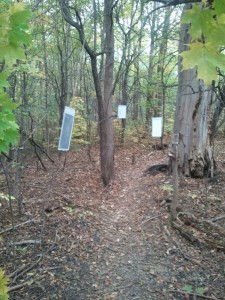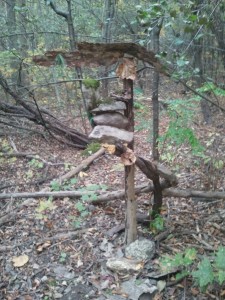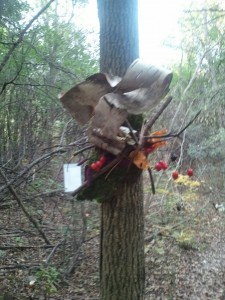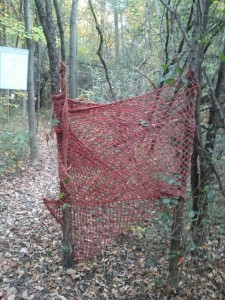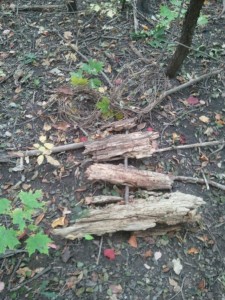Among this youthful energy lies a poem, playing off the ancient renga form, called Autumn Wood. A renga in the strictest sense is a linked 100 stanza poem, with a meter grandparent to the haiku. It’s an ancient collaboration form of the poem-the first renga recorded was a shared experience between a buddhist nun and Ōtomo no Yakamochi, one of the 36 Poetry Immortals, in the 8th (!) century. Our Middlebury renga shares only the collaboration part, but is an installation through the woods along the TAM trail.
Walking through the woods one confronts poetry hanging from the trees in white lacquered paper. The poems, at least the ones I had the brief time to read, share the common theme of the environment they hang in, but don’t strictly make up a single cohesive unit like a true renga. Interspersed among the poems are photographs, some even of the item they hang upon.
Along the path lies art, almost hidden in the forest, peering out. Buds, berries, bark, and branches are woven together, or even just artfully lying on the ground, with rock and soil used to ground them. Some of these are subtle, and may only been seen on the walk back, while others jump out on the trail.
My favorite piece is naturally by my wonderful wife, a crocheted net hanging on some buckthorn. Should I worry about the direction her art is taking?: last years scarf is called Marley’s Ghost, a felted knit chain, and now a net…
My favorite poem is a timely piece written by John Elder-
Warm September woods- all these lovesick mosquitoes from Irene’s pocket.To visit, go park up at Kirk Alumni Center (the golf course) and carefully walk across Route 30 to the big sign on the start of the TAM trail. The installation is scheduled to be up through the random date of October 27th, a thursday, so this is your weekend to go experience it. Hopefully the organic art will remain to meld with the forest floor.
